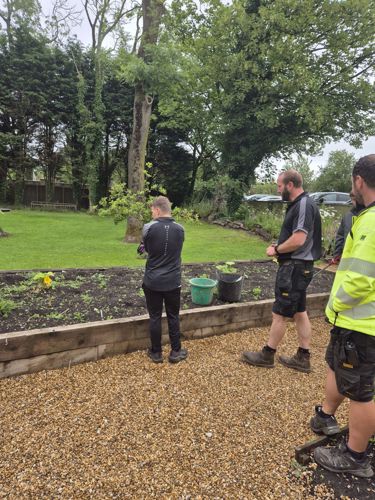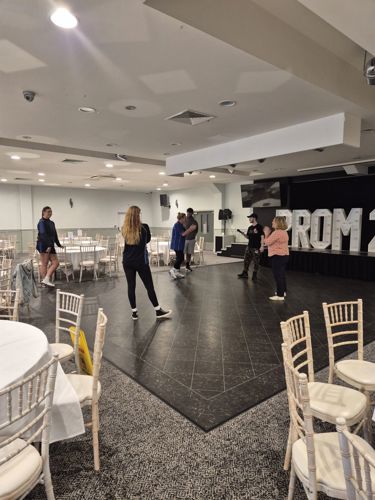
Myerscough foundation learners impress on Supported Internships
Published: Thursday 13 November 2025Myerscough College offers opportunities available for young people who are neurodivergent or have learning disabilities to gain valuable skills in the workplace.

There are many misconceptions about employment for individuals who are neurodiverse or have a learning disability or additional support needs.
Supported Internships are designed for young people 16-24 with an Education, Health, and Care plan (EHCP) who are looking for a route into paid work.
The programme includes a structured, work-based programme with a substantial work placement, facilitated by the support of a job coach.
Many Myerscough College foundation learning students have gone through this scheme, undertaking work placements with local employers including Save the Children, Sue Ryder, and Coggins Sustainable Office Solutions, among many others.
Supported Internships can have a huge impact, not only on the life outcomes of the interns who take part, but on the host organisation and wider society too.
Students go on a weekly placement to build on their employability skills and prepare them for future employment or work experience.
Supported Internships are work-based study programme where students with an EHCP (Educational Health Care Plan), and between ages of 16-25 are gaining the employability skills they need to be work ready. Myerscough supports students to kickstart their career by exploring different job opportunities, guest speakers, whilst student immerse themselves in our bespoke career programme as well as tailored support and work placements.
Internships normally last for one year and they include a work placement. Students complete a personalised Study Programme working towards a qualification, usually ‘Employability Skills’. Maths and English are also delivered as an important element.
One current group of foundation learners are undertaking a supported internship programme at Ribby Hall Village, at Wrea Green, near Blackpool.
The partnership, in association with national charity DFN Project SEARCH, the group have Myerscough learners have been undertaking a variety of roles within the business at Ribby Hall since the start of term in September, and have already made a highly promising impression.
David Parkinson, Myerscough’s employability tutor and job coach programme leader, said: ‘’The Supported Internship programme at Ribby Hall Village has had an amazing start and is already making a meaningful impact, helping young people develop essential workplace skills in a supportive and inclusive environment.
‘’It’s inspiring to see how far our interns have come. Their enthusiasm, professionalism, and willingness to learn are credit to Myerscough college and Ribby Hall Village. I would like to thank all the Ribby Hall Village staff for all the support that you have provided for the students.
‘’The Ribby Hall staff have comments have commented that our students are hardworking, fast to learn, better than some new employees that have started, will try anything and want to progress.''

‘’The programme is designed to bridge the gap between education and employment, giving interns the opportunity to gain hands-on experience while receiving tailored support.
‘’We’re proud of the progress being made and look forward to sharing more success stories as the year continues.’’
Claire Thompson, Myerscough’s Director of Inclusion, added: ‘’This collaboration marks a significant step forward in providing incredible opportunities for young adults with learning disabilities.
‘The programme is designed to equip interns with valuable work experience, develop essential life skills, and support them in securing paid employment.
‘’A huge thank you to everyone involved in making this partnership a reality. We can't wait to see our students thrive in this supportive and empowering environment at Ribby Hall Village.’’

At the end of the programme the interns stand a real chance of gaining employment. Their employability skills are significantly enhanced from when they started. Their work colleagues and supervisors also have the opportunity to experience the value first hand of employing a young person with special or additional needs.
A vital part of the programme is about removing misconceptions regarding young people with learning difficulties with employers. Many in the workplace are surprised what a positive contribution these young people make. It’s about creating work-ready young people and removing any barriers that may be present in the workplace that could stop the employer from taking on such a young person.
Just six percent of young people with learning difficulties are in employment, and the aim of the scheme is to help them transition from education into the world of work, so they can live more independently and don’t become socially isolated.
For more details about the scheme, available at our Preston and Liverpool centres, CLICK HERE
If you have a business or work for an organisation within close proximity to our centres or the Lancashire area please contact us if you are interested in supporting a student on placement in the future.
FAQs
What’s a Supported Internship?
A work-based study programme for 16 to 24-year-olds with SEND, who have an education, health and care (EHC) plan.
The core aim of a supported internship study programme is a substantial work placement, facilitated by the support of an expert job coach.
How do they work?
Supported interns are enrolled and supported by a learning provider, for example, a school or college, but spend most of their learning time in a workplace.
Supported interns are in full-time education, and their supported internship work placement are part of their course. There is no legal requirement or expectation that the supported intern will be paid.
What are the benefits of offering a Supported Internship?
They have a transformative effect on the interns who take part. They offer real work experience combined with training in employability and independent living skills delivered in a business setting to help young people make successful transitions to productive adult life.
They also offer several economic benefits to the employers, providing access to a new, diverse talent stream with skills to match labour needs.
MythBusters
Myth: People with a learning disability are less productive than those without disabilities.
Fact: Research shows that people with a disability (including a learning disability) perform as well as, or better than, other employees.
Myth: People with a learning disability are more likely to be absent from work.
Fact: A comprehensive study showed that people with a learning disability take less sick leave, are more punctual and stay longer in the job.
Myth: People with a learning disability do not have the skills to work.
Fact: Research shows that if anything prejudice and lack of opportunity prevent people with a disability from using their skills.
Myth: It is more expensive to recruit people with a learning disability.
Fact: Even when there is an extra cost in recruitment, lower job turnover and absences offset them.
